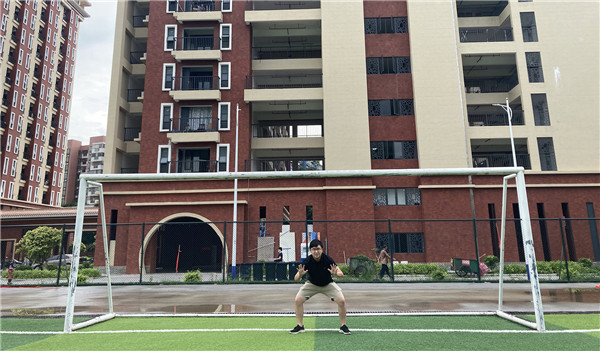“生地”“熟地”
〔新加坡〕袁梓朗 廣州中醫藥大學

2012年,我從新加坡來到嶺南千年商都廣州追尋我的中醫夢,一齣機場看到這陌生的土地,聽到周圍充滿廣東話與普通話的交流,感受著這既熟悉又陌生的人文,不禁嘆道:“生地!”我從小受到家人的熏陶而對中醫學有濃厚的興趣並從小受到廣東文化的影響,廣東氣候與生活和新加坡較相似,所以我選擇到中國廣州中醫藥大學學習最正宗、最專業、臨床療效最優的中醫。
早已耳聞廣州不單單商業發達,還是座充滿著大大小小的美食的城市,正所謂“食在廣州”,對於我這位新加坡大吃貨甚是美哉。本科階段認識不少廣東本地的同學,課餘時間他們帶著我吃遍“陳添記”“超記”“陶陶居”“惠食佳”等,早茶、腸粉、煲仔飯、啫啫煲,凡所應有無所不有。在廣州,大街小巷都能看到不少涼茶鋪與賣藥材的店,作為中醫學生的我為此非常興奮,總是聞聞與嘗嘗店舖裏各種藥材的味道,感受它們的四氣五味,想像它們如何在人體裏運作歸經。除此之外,我還參加很多學校的社團以及比賽,認識了許多來自五湖四海的朋友,讓我知道了中國各地一些不同的人文風情,因此有了到各地探索的心。在各地旅遊中也出現過不少插曲,如在昆明計程車上不見了行李,除了同學幫忙,當地的警察也非常熱心地幫我調取監控找到計程車並拿回衣服,當時心裏感覺暖流不斷徘徊。

袁梓朗在學校足球場
本科期間,發現手機在日常生活中變得越來越重要。特別有感觸的是,微信在大一的時候還只是一個聊天軟體而已,到大三後就變成我們不可缺少的移動支付工具,圍繞著我們的衣食住行,可謂“機不可失”。新加坡的朋友來到中國找我玩,看著我掃一個個二維碼,以為我在掃什麼優惠,想不到我在付款,這讓他們感覺自己貌似“鄉巴佬”。還記得我們新加坡總理李顯龍也在國慶群眾大會説道:“中國是世界上移動支付最先進的國家。”中國有太多東西值得我學習,因此我選擇繼續在中國攻讀碩士博士。這一方面能加深我的理論知識與臨床能力,另一方面我希望有更多的時間好好認識中國,開闊我的視野。五年一晃而過,校園的每一個角落,上下課的路上,一個個掉落的杧果,一張張熟悉的面孔,像一個個鏡頭在腦海中閃過,感覺自己也慢慢“熟了”,不知不覺對廣中醫産生了家一樣的感覺。
研究生階段我把更多的時間投入到專業知識與臨床能力的提升中。三年來跟著導師學習,不但在導師身上學到知識與技術,並且受到他高尚品德的熏陶。讓我深刻地明白我們在治療檢查疾病時,獲得的可能是八綱臟腑六經、解剖學、病理生理學方面的東西;在治療檢查人時,我們獲得的是生活與生命。在臨床上接觸的患者大多是廣東人,幸好新加坡是多語言國家,而我家也有講粵語,在溝通上還是沒難度,這讓我拉近了與患者距離。
從中藥炮製學我們知道生地需要經過九蒸九曬方能成為熟地。今年也是我來廣州中醫藥大學的第九年,經過九年熏陶學習,由開始感覺的“生地”變為如今的“熟地”。非常感恩這片熟地為我養血滋陰與補精益髓,讓我在漫漫人生路上走得那麼紮實。
From Shengdi to Shudi
〔Singapore〕 Yuen Zi Lang, Guangzhou University of Chinese Medicine
In 2012, I left Singapore for Guangzhou, the thousand-year-old commercial capital of Lingnan, to pursue my dream of studying traditional Chinese medicine (TCM). Once I left the airport, I saw the unfamiliar land, heard the exchange of Cantonese and Putonghua around me, and felt the familiar and strange cultural shock. I couldn’t help but sigh, “Shengdi,” which literally means new land. I was brought up with a strong interest in TCM by my family and influenced by Cantonese culture since I was a child. Both the climate and life in Guangdong are more similar to Singapore, so I chose to study the most authentic, professional and clinically effective TCM at Guangzhou University of Chinese Medicine.
I have heard that Guangzhou is not only a city with developed business, but also a metropolis full of big and small cuisines. A saying goes that “Eating in Guangzhou”, which perfectly suits me – a fervent foodie from Singapore. During my undergraduate studies, I met many local students from Guangdong, who took me to eat in “Chan Tim Kee”, “Chaoji”, “To To Kui”, “Wisca Restaurant” and so on after class. We ate various morning dim sum, steamed vermicelli roll, clay pot rice, juejue pot among many other cuisines. In Guangzhou, you can see many herbal tea stores and stores selling herbs in the streets and alleys. As a TCM student, I was always fascinated to smell and taste the various herbs in these stores and to imagine how they run through the human body. I also participated in different school clubs and competitions, and met many friends from all over the world. I learned about the different cultures and customs of China, and therefore had the desire to explore all over the country. When traveling around the nation, there happened a lot of anecdotes. In Kunming, Yunnan Province, I lost a piece of luggage at a taxi. In addition to my classmates’ assistance, local police officers were so kind to help me check the surveillance video to look for the cab and get my luggage back soon. At that time my heart felt so warm.
During my undergraduate years, I found that cell phones are becoming more and more important in daily life. I was particularly impressed by the fact that WeChat was just a chat software when I was a freshman. But after my junior year, it became an indispensable mobile payment tool for food, clothing, housing and transportation. When my friends from Singapore came to visit me in China, they were surprised by my sweeping of QR codes. At first, they thought those codes represented discounts. But in fact, I was making payments, which made them feel like “country bumpkins”. “China is the most advanced country in the world in terms of mobile payments.” Said Singaporean Prime Minister Lee Hsien Loong at the National Day mass gathering. There are so much to learn in China, so I decided to continue my master’s and doctor’s study in Guangzhou to deepen my theoretical knowledge and clinical skills. By doing so, I wanted to have more time to know China and broaden my vision. Five years have passed rapidly, and I became familiar with every corner of the campus. On the way to and from classes, I noticed fallen mangos on the ground, familiar faces greeting each other. One by one such image flashed in my mind, I feel that I am slowly getting used to it, and Guangzhou University of Chinese Medicine has become another home of mine.
During my graduate studies, I devoted more time to the improvement of professional knowledge and clinical ability. Following my tutor for three years, not only did I learn knowledge and techniques from him, but I was also influenced by his noble moral character. I became to understand that when we treat patients and examine diseases, what we may obtain is the information of internal organs, anatomy and pathophysiology. When we treat and examine people, we get knowledge of his life and spirit. Most of the patients I come in contact with are Cantonese. Because Singapore is a multilingual country and Cantonese is spoken in my home, so there is still no difficulty in communication, which allows me to get closer to my patients.
From the processing of TCM, we know thatShengdi, the raw Rehmannia Glutinosa, needs to be steamed and dried for nine times before it can becomeShudi, the dry Rehmannia Glutinosa. This year is also my ninth year in Guangzhou University of Chinese Medicine. After these years of study, Guangzhou has become aShudi, or familiar place, fromShengdi, new land. I am very grateful to this land for nourishing my blood and spirit, so that I can walk so solidly on the long road of life.



